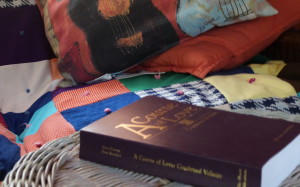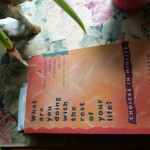 If you can’t remove yourself from life, what choice have you but to join with it? Love it. Love yourself. Love yourself enough to accept yourself. Love will transform normal, ordinary, life into extraordinary life. Loving exactly who you are and where you are in every moment is what will cause the transformation that will end your desire to remove yourself from life. All those frustrations you currently feel have a purpose: To move you through them and beyond them—to acceptance. D:Day8.2
If you can’t remove yourself from life, what choice have you but to join with it? Love it. Love yourself. Love yourself enough to accept yourself. Love will transform normal, ordinary, life into extraordinary life. Loving exactly who you are and where you are in every moment is what will cause the transformation that will end your desire to remove yourself from life. All those frustrations you currently feel have a purpose: To move you through them and beyond them—to acceptance. D:Day8.2
I don’t know why, but I was thinking of the “Is that so” saying as I walked out to the cabin this morning. It goes about like this: The farmer’s horse ran away and the neighbors said, “That’s awful” and he said, “Is that so?” Then the horse came back with nine companions and the neighbors said, “Isn’t that wonderful.” The farmer said, “Is that so?” Then his son was riding one of the horses and was tossed and broke his leg. The awful / is that so repeat. Then war started and the army came to get his son and left him because of his broken leg. Same response.
But…nowhere do we hear that the farmer still tills his fields, or that as each thing happens he has to expend renewed thoughtfulness regarding how he’ll plow the field. We can intuit that he wouldn’t overthink it or fuel it with fearful thoughts of gloom or doom, punishment or reward. It IS an open attitude. “We’ll see” implies that he doesn’t worry about it. He carries on differently as things change; but he carries on. That’s the story. (The story that’s missing.) He still has to be a farmer or he wouldn’t be a wise man. He would starve.
So in the “Is that so” saying, the story is missing, the story of innovation. The way the farmer, even being fully accepting of “what happens,” changes his ways so that he can carry on. His choice might not lie in what to do, but in how to do it. I imagine him carrying on with equanimity. Nonjudgment helps with that. Yet for me, even without judgement, I’d say there’s a tone and timber to change, and times when change feels crucial, and times when change feels like smooth summer breezes moving life along through gentle incremental cycles. It’s like aging. We’re aging every day. We hardly even think about it. Then we get an illness, or lose our flexibility, or get to be somewhere around sixty years old and aging can come on like a storm. Suddenly there is a critical feeling in the air, a sense that the changes coming require some preparation. A mid-life career change can have that feel. A divorce. A move. A calling. A grandchild.
Unfortunately popular images of these various changes guide us all too often to inaccurate perceptions. Grandparents, for instance, get portrayed with sentiment, (the doting grandparent) or as “spoilers” through the provision of material goods. This can rob grandparents of insight into the wisdom they bring, the sense of mentoring, of fostering interests and talents, introducing a child to life, and honing observational skills into a sixth sense that sees promise and potential and insecurities too. Being a grandparent refines love and expands it, and gifts us with wonder and a renewed capacity to be like the little children.
often to inaccurate perceptions. Grandparents, for instance, get portrayed with sentiment, (the doting grandparent) or as “spoilers” through the provision of material goods. This can rob grandparents of insight into the wisdom they bring, the sense of mentoring, of fostering interests and talents, introducing a child to life, and honing observational skills into a sixth sense that sees promise and potential and insecurities too. Being a grandparent refines love and expands it, and gifts us with wonder and a renewed capacity to be like the little children.
In that way, it is much like what ACOL can provide…only, maybe, it feels more natural! The way of ACOL is to return us to what is natural in us. But how do you know that the way you’ve been has been unnatural until you begin to change and feel the difference?
A Course of Love says we’re already prepared. That saying has made me cry. I do not always feel prepared for what life brings, or what I anticipate the future holds. But I have found that preparing feels less than natural these days, and therein lies the rub of such times.
However, I just read a wonderful book that was written by a woman I’ve come to know through ACOL’s Facebook group. I read this book cover to cover in two days. It’s the first time I’ve done that in a very long while. It had the right tone for me. It wasn’t teacherly. It was practical, personal, and spiritual, all at the same time. This book is Paula Payne Hardin’s What are you doing with the rest of your life?: Choices in midlife. It was published in 1992 and the book has stood up to the test of time. I devoured it. It arrived in the same package as the Brené Brown book I was awaiting, but browsing them both, I quickly chose Paula’s book.
They are each, in a sense, about how we deal with life challenges. Often, I have found this consideration an undervalued facet of spirituality. It certainly has been for me. I want to disregard the practical every time, and so facing the practical can feel like a force.
The questions of life aren’t immaterial to the new life ACOL promises. They’re part and parcel of it. We’re not to remove ourselves from life in any way. And if we accept this, we stand in the thick of where we are, feeling as we feel—whether it is prepared or unprepared. Many of us probably know a person or two who took their spirituality to mean they did not have to be prepared for “regular” life. Some sailed off into the sunset of abundance, others had the bottoms fall out of their lives, still others experienced a bit of both. I’d probably count myself in that last category and even say that through it, I found the value in touching bottom. But that doesn’t mean I want to continue to do so. Life’s wisdom, I have found, is not immaterial. There is a wholeness to life and spirituality inherent in the idea of the elevated Self of form.
I love it when I find ACOL’s wisdom deeply imbedded in a work like Paula’s…even while it’s a work from twenty years ago. It gives it that aura of perennial wisdom.
 Here’s a quote from the book that shares what I mean: “Relationship is the great teacher of the heart. It comes in many forms and holds up many mirrors as we learn who we are. In discovering our true Self, separate and whole, we begin to exchange dependence for independence, and learn to create family relationship in new and healthier ways.” It was perfect for me because one of my transitions is adjusting to new relationships with my family. Another wonder was her chapter on Endings and Beginnings. My friend Mary was over earlier today, and we talked of our mothers’ needs and her mom’s impending move to assisted living. We both teared up as she used these same words. “It is a time of endings and beginnings.”
Here’s a quote from the book that shares what I mean: “Relationship is the great teacher of the heart. It comes in many forms and holds up many mirrors as we learn who we are. In discovering our true Self, separate and whole, we begin to exchange dependence for independence, and learn to create family relationship in new and healthier ways.” It was perfect for me because one of my transitions is adjusting to new relationships with my family. Another wonder was her chapter on Endings and Beginnings. My friend Mary was over earlier today, and we talked of our mothers’ needs and her mom’s impending move to assisted living. We both teared up as she used these same words. “It is a time of endings and beginnings.”
Also in this chapter Paula quotes psychologist Virgina Satir and talks of the value of chaos. “In chaos you can no longer go back to what was because there has been a death to the former order, nor do you know where you are going because the new life possibilities are still hidden.” In chaos, we find the dark void and the pregnant feeling of new opportunities. Paula shares a journal entry here, and she introduces it in this way: “You can negotiate the process more easily when you know that there is meaning and purpose in what is happening to you.”
This kind of sharing is exactly what I feel ACOL encourages us toward. We discover, through our shared experiences, that we are not alone, and that there is “meaning and purpose” in what is happening. I am thankful to Paula, and to all who share their life experience!


And you will LOVE the book!
Well all I can say is, I just ordered Paula’s book! Love you guys
Derek, just read your response to Mari’s post and am still resonating (like a base viol resonates long after the bow is removed) with your thought on accepting how we ‘feel’ about any situation or circumstance as the welcome mat for the Self. This for me is key, and only came to me with the power it now has for me, in ACOL. I look forward to following some of your postings as my life settles a bit into new grooves here in Florida and time opens up.
Thanks Mari. I wanted to share a comment after just finishing reading this Blog Post this afternoon.
It reminded me – especially parts of Paula’s book that you shared – about ‘acceptance’ which I am currently discovering is the ‘key’ to transforming life as we know it. As I continue with the new Review Series on ‘feelings’ – which incidentally starts with the same opening paragraph to your Blog Post – I continue to read about the importance of accepting how we ‘feel’ about any situation or circumstance that we are in in any moment to authentically express who we are. This leads to expression of the Self. I also found your last Blog Post about ‘badassry’ to be about this same, authentic experience of being in the moment with what is – although I point out the emphasis in ACOL on accepting one’s inner experience first to transform the outer experience. Love to you Mari (and Paula).
Wow, I said those things? I haven’t read the book for years and in those years I have changed ever so much, especially since being blessed by A Course Of Love. It’s been almost a year now that I’ve been immersed in this blessed conversation with Jesus and I am so grateful because it has met me at my point of need over and over. Mari, thank you for this affirmation of my spirit as it came to you through that book.
Paula, I’m so with you with that opening question of “I said those things?” Sometimes I’ll hear a quote from one of my other books and be so surprised that it is mine! I hope you loved hearing these again and am so pleased that my appreciation is felt as an affirmation of your spirit. Honestly, I felt that “you” came through the book and talked with me, and like I got to know you while I was getting to know myself better. I know you wouldn’t necessarily use the same language or say exactly the same thing now. None of us would. Books capture a present time. But the good ones are also timeless and universal….because we are, and we’re in there, and we’re representative of the human condition and the divine as well. It seems so clear to me when I see it in someone else (less clear with myself most of the time) ! Your presence is clearly the gem of this book. Thank you again.